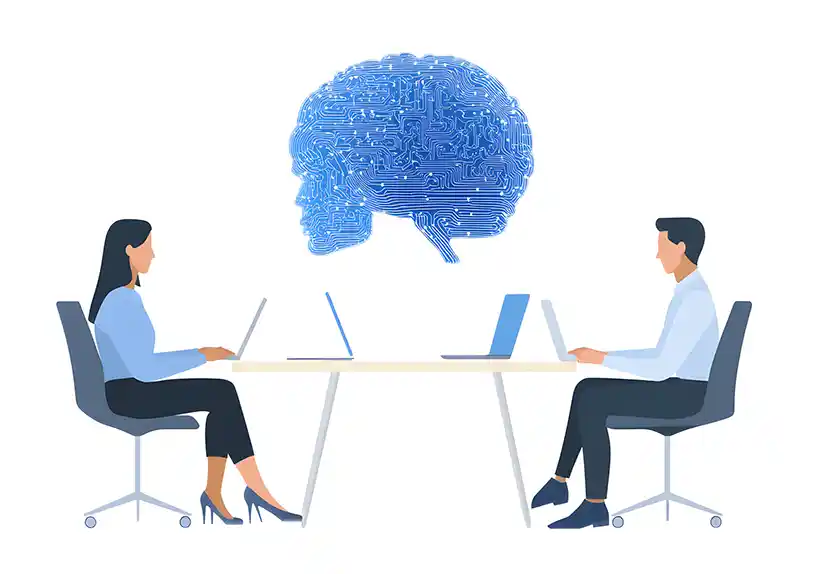What is a Marketing AI Agent?

Mike Vertal

In today’s fast-paced digital landscape, marketing teams are constantly seeking ways to do more with less—less time, less budget, fewer resources. That’s where Marketing AI Agents come in. These smart, autonomous software agents use artificial intelligence (AI) to help businesses automate, personalize, and optimize marketing activities across every touchpoint. From handling lead qualification to creating personalized content at scale, a Marketing AI Agent can be a powerful partner in driving growth and improving return on investment (ROI).
But what exactly is a Marketing AI Agent? How do they work? And what are the real-world benefits for your business? Let’s break it down.
Defining a Marketing AI Agent
A Marketing AI Agent is a software-based intelligent assistant powered by large language models (LLMs), machine learning, and sometimes retrieval-augmented generation (RAG) or rules-based logic. It is designed to automate and enhance marketing functions such as lead engagement, customer communication, campaign execution, content generation, market research, and performance analysis.
Unlike basic marketing automation tools that follow pre-set workflows, AI Agents are dynamic—they can adapt to conversations in real time, respond based on nuanced understanding, and learn from new data. These agents can be embedded across websites, email platforms, social channels, and CRM systems, offering a persistent, always-on presence for your brand.
Core Capabilities of a Marketing AI Agent
The exact capabilities depend on how the AI agent is trained and integrated, but here are some common functions:
1. Conversational Lead Engagement
AI agents can act as the first point of contact on your website, engaging with visitors in natural language to answer product questions, qualify leads, and guide users to conversion paths. These agents analyze user intent and personalize their responses based on what they know about your brand and offerings.
2. Automated Content Creation
From blog posts and email copy to ad headlines and product descriptions, AI agents can generate high-quality, brand-consistent content in seconds. They can be trained on your tone, style, and messaging guidelines to keep everything on-brand.
3. Campaign Optimization
AI agents can analyze campaign performance data and recommend adjustments in targeting, content, or timing. Some agents can even autonomously run A/B tests and allocate budget dynamically based on what’s working.
4. Customer Journey Orchestration
An AI agent can deliver personalized experiences across channels by using customer behavior data to predict next-best actions—whether that’s sending a follow-up email, displaying a specific CTA, or routing the lead to a sales rep.
5. Market and Competitive Intelligence
AI agents can be configured to monitor news, social media, competitor content, and market trends—then summarize insights for marketing teams. This allows for faster, data-informed strategy decisions.
How AI Agents Differ from Traditional Automation
While marketing automation tools like HubSpot or Marketo rely on pre-programmed sequences and static rules, AI agents are dynamic and context-aware. They use NLP (natural language processing) to understand human inputs and respond in a conversational manner. Here’s a quick comparison:
|
Feature |
Traditional Automation |
Marketing AI Agent |
|
Workflow design |
Static, rule-based |
Adaptive, AI-driven |
|
Personalization |
Basic (if/then rules) |
Deep, real-time personalization |
|
Data usage |
Historical |
Real-time + historical + predictive |
|
Interaction style |
Forms, emails |
Natural language, chat, voice |
|
Learning ability |
None |
Self-improving with feedback |
In essence, an AI agent offers intelligence and flexibility that older tools simply don’t.
Real-World Use Cases
Let’s look at a few practical applications of Marketing AI Agents in real businesses:
E-commerce
An AI agent on a retail website helps shoppers find the right product by asking contextual questions, checking inventory, and offering personalized discounts. It can also follow up via email if a user abandons their cart.
B2B SaaS
A software company uses a website-embedded AI agent to greet visitors, understand their use case, and offer demos or whitepapers. Qualified leads are passed directly to sales via CRM integration.
Media & Publishing
An AI agent recommends articles based on reading history, summarizes long-form content, and even helps the editorial team generate headlines and SEO snippets.
Event Marketing
An agent assists with pre-event promotion by answering attendee questions, suggesting sessions, and even summarizing post-event analytics and feedback.
Benefits of a Marketing AI Agent
Deploying an AI agent in your marketing stack unlocks a wide range of business benefits:
1. 24/7 Engagement
No more missed opportunities. Your AI agent can engage and convert prospects even while your team sleeps.
2. Scalability
Run personalized marketing campaigns across thousands or millions of users without growing your team.
3. Faster Time-to-Value
Get answers, content, and campaign insights instantly—cutting down on time-consuming tasks like research, writing, and data crunching.
4. Improved Conversion Rates
By delivering the right message at the right time, AI agents can significantly improve conversion rates across the funnel.
5. Cost Efficiency
Reduce dependence on outsourced marketing or bloated software stacks by centralizing key functions within a single AI-powered interface.
Key Considerations Before Deployment
Before implementing a Marketing AI Agent, it’s important to plan carefully. Consider:
- Training Data: The quality of your content, messaging guides, and CRM data will directly impact performance.
- Integration: Ensure the AI agent can integrate with your CMS, CRM, email, analytics, and ad platforms.
- Governance: Set clear rules for tone, brand voice, escalation, and privacy compliance.
- Feedback Loops: Choose a platform that supports feedback collection and model refinement over time.
The Future of Marketing with AI Agents
Marketing AI Agents aren’t here to replace marketers—they’re here to empower them. As models improve and integrations deepen, these agents will become creative collaborators and strategic advisors. They’ll help marketers go from reactive to proactive, from fragmented to unified, and from intuition-based to data-driven.
In a world where attention is scarce and personalization is paramount, AI agents offer the responsiveness, intelligence, and efficiency modern marketing demands.
Summary
A Marketing AI Agent is more than just a chatbot or automation tool. It’s a transformative technology that allows brands to engage customers with intelligence, creativity, and scale. Whether you’re looking to drive more qualified leads, produce better content, or understand your market faster, AI agents can be a strategic asset in your digital marketing toolkit.
As AI continues to evolve, marketing teams that embrace these agents early will gain a competitive edge—turning data into action, and interactions into conversions.



